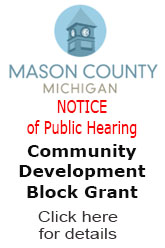 Eden Township’s Indian Cemetery, part 1.
Eden Township’s Indian Cemetery, part 1.
Around the County – History is a presentation of Preferred Credit Union, www.preferredcu.org, located locally at 266 N. Jebavy Dr., Ludington.
By Rob Alway, Editor-in-Chief.
Editor’s Note: This is the first of what I expect to be a series of stories on the Eden Township Indian Cemetery. As with any of my history stories, I am always open to feedback and corrections. Please email me if you have any feedback: editor@masoncountypress.com.
Cemeteries can tell lots of stories. I enjoy walking through the local cemeteries and researching the history of those buried in them. One of the most unique cemeteries in Mason County is the Eden Township Indian Cemetery (that’s it’s name) located on Major Road between Darr and Cabana roads in Eden Township.
 The land that is now Eden and Custer townships in Mason County and Crystal and Elbridge townships in Oceana County was designated as a Native American reservation in 1855 by the federal government.
The land that is now Eden and Custer townships in Mason County and Crystal and Elbridge townships in Oceana County was designated as a Native American reservation in 1855 by the federal government.
The reservation included its own school, Resseguie School, located at the intersection of modern Custer and Wilson roads in Custer Township. (See related story here). It also included a cemetery, which was deeded to the township by John and Lucy Mash Kaw on Feb. 7, 1880.
Approximately 1,700 Native Americans (mostly Ottawa) were relocated from the Grand River watershed area as the City of Grand Rapids, and other settlements west became populated by non-native settlers. Between 1857 and 1872, the U.S. government made payments to the Ottawa ranging from $13 to $75 annually.
The Ottawa were brought to the area via boat from Grand Haven to Pentwater (ironically, one of the boats, a steamer, was called “The Ottawa”). Among those arriving were the family of Chief John and Wahonoquay (Wah e ne qua) Maish (Mash Kaw/Maish Caw).
According to the academic paper “The Ottawa and Chippewa bands in Michigan and the Allotment of their Lands under the Treaty of July 31, 1855,” by Larry M. Wyckoff, John Maish caw belonged to a band of Ottawa who lived at the rapids of the Grand River (now known as Grand Rapids). The band was associated with the Baptist Mission established there in 1826 by Isaac McCoy and superintended by Leonard Slater. In 1836 the chief of the band was Noah qua ge shik (Noonday). Shortly after the 1836 treaty, the band left the rapids and Leonard Slater purchased lands in Barry County for a new mission called Ottawa Colony. Slater sold individual lots to members of this band. In 1838 the population of the band was 121 individuals. Noonday remained the chief of this band until his death in 1847 when Maish caw took over as chief.
At the time of the 1855 treaty, there were 113 members of the band. After removal to their reservation they selected allotments in two distinct locations. Maish caw and about one half of his band took their allotments in Elbridge Township. Another group took their allotments in Custer and Eden townships.
Chief John Maish caw received 80 acres (S 1/2 of NW 1/4, section 21, T15N, R16W) in Elbridge township.
John and his wife had four children (it is possible that they had additional, but this is the information that has been found so far): James, born in 1832; John, born in 1841; Peter, born in 1843; Saha, born in 1846; and Issac, born in 1852.
There are many variations listed for the spelling of the surname of the family, according to online sources. Moving forward in this article, the name will be referred to as Mashkaw, which seemed to be the common spelling in the 20th century.
Brothers James and John enlisted in the U.S. Army on July 4, 1863. They were both killed on May 12, 1864 during the Battle of Spotsylvania Court House in Virginia. The battle was the second major battle of Lt. Gen. Ulysses S. Grant’s 1864 Overland Campaign.
James’ widow received a pension of $8 per month. On July 9, 1870, Chief Mashkaw received title to son John’s land.
On Feb. 7, 1880, Peter and Lucy Mashkaw deeded about three acres of land to Eden Township to be used as an Indian cemetery. The cemetery only has a handful of marked graves and doesn’t appear to have been active in years. According to Roger Nash, current Eden Township supervisor, the cemetery has many more graves that are unmarked. He said the township maintains the cemetery but records are sketchy.
According to the 1880 census, Peter Mashkaw owned 40 acres of land in Eden Township. At age 35, he was listed as a farmer. When he acquired the land is not known. The 1880 census also lists Peter’s wife as “Nancy,” though this was likely a clerical error. Children listed included Sarah, age 9; Amy, 5; and John, born that year. His brother, Isaac, 23, was also living in the household along with their mother, Wah own qua, 75. Son, Peter, is not listed.
Peter’s first wife, Lucy (marked on the cemetery sign as “Sucy”) died in 1886, at the age of 41, of consumption. Their 9-year-old son, Peter, died in 1886 as well of “fever.”
Peter then married Anfeline (or Angeline) Palaume Bailey on Jan. 18, 1887. By 1900 records show that Peter and his family had moved to Leelanau County near Omena (between Suttons Bay and Northport). In 1909, he married Susan Walker. Peter died of tuberculosis on March 24, 1911 in Hayes Township, Charlevoix County. He was 68 or 69.

Grave of Karl Henrickson
The Hendricksons of Sippy Road
One unique situation, and one of the few marked graves, is that of Karl Hendrickson, who died, at the age of 15, on Nov. 2, 1888. Karl died when a gun fell and accidentally killed him. He was the son of Louis (1852-1906) and Anna Hendrickson (1847-1905), who lived on East Sippy Road, about a half mile east of Custer Road. The Hendricksons occupation of the cemetery is “unique” because they were not Native Americans but rather Swedish.
The Henricksons arrived in Pentwater, from Sweden, in 1881. They eventually purchased their Eden Township farm among the native Americans. This was a time when the reservation land was being sold to private interests.
Anna died on Sept. 5, 1905. Louis died on March 21, 1906. According to a biography posted online, Louis may have died during an estate sale of the farm. Both are buried in the Indian Cemetery in unmarked graves, likely near Karl’s grave.

Anna Henrickson
Louis and Anna had five children: Karl (1873-1888), Henry (1875-1915), Oscar, Mary, and Louisa.
Henry, being the oldest son when his parents passed away, inherited the family farm. He died, at the age of 39, on May 14, 1915, leaving the farm to his wife, Lucinda Bowman Hendrickson (1889-1954). Henry and Lucinda had four children: Nelvin Leonard (1904-1979), Clifford Wilford (1906-1981), Richard Marshall (1910-1977) and Hugo Henry (1913-1994).
Lucinda was the daughter of Phillip and Emma (Betz) Bowman. She was born in Bronson and the family moved to Eden Township, Mason County, when she was a child. She and Henry were married when she was 15, 14 years younger than her husband.
Four months after Henry’s death, in September 1915, Lucinda married Duane Durham of Hart. In 1916 or 1917, Duane was apparently unable to pay a mortgage debt and they lost the Henrickson’s Eden Township farm. They moved to Ludington in December 1917. Lucinda gave birth to a girl, Irene, who passed away in May 1918. In 1923, Lucinda was granted divorce on the grounds of desertion. The day the divorce was granted, Durham apparently married another woman.
When Lucinda passed away in 1954 she was living at 106 S. Delia St. in Ludington.
Read more on history of Native Americans in Mason County here:
Notipekagon, when the PM ran red with blood.
Resseguie School served Custer Township for over 100 years.

Please consider helping to fund local news. Mason County Press and Oceana County Press are available for free thanks to the generous support of our advertisers and individuals who support our service. Click on the PayPal donation button located on the top right of our website.
This story is copyrighted © 2021, all rights reserved by Media Group 31, LLC, PO Box 21, Scottville, MI 49454. No portion of this story or images may be reproduced in any way, including print or broadcast, without expressed written consent.
As the services of Media Group 31, LLC are news services, the information posted within the sites are archivable for public record and historical posterity. For this reason it is the policy and practice of this company to not delete postings. It is the editor’s discretion to update or edit a story when/if new information becomes available. This may be done by editing the posted story or posting a new “follow-up” story. Media Group 31, LLC or any of its agents have the right to make any changes to this policy. Refer to Use Policy for more information.



















.jpg)























 (1).gif)












.png)






